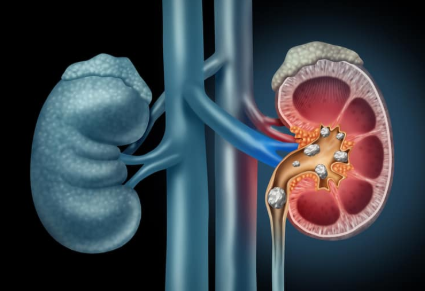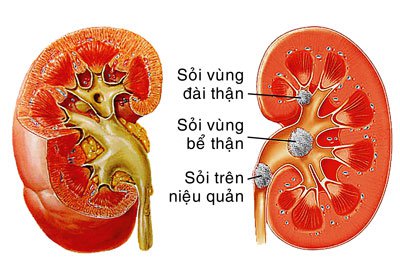What are urolithiasis, how urinary tract stones form, is the disease dangerous,… are questions that are of interest to many people. The article below will give us the necessary information around this issue.
1. How do urinary tract stones form?
Urolithiasis is a common disease, which is the main cause of cramping pains in the kidneys. The process of formation and development of urolithiasis is divided into the following 3 stages:
1.1. Early stages
At this stage, new stones arise, move and have not caused urinary obstruction, have not caused symptoms or complications. This period usually lasts for about 2 years. When stones are first formed, the person usually has no symptoms or symptoms that are very faint so often ignore. However, if you go to the urolithiasis examination and detect and treat medical treatment in a timely manner during this onstal stage, the effectiveness of treatment of urolithiasis will be up to 80%.
1.2. Stages to intervene
During this period urolithiasis has been blocked, not moving, causing symptoms and some complications such as dilated renal tank but has not caused serious complications so it is still possible to restore renal function after taking out the stones.
The obvious symptoms of urolithiasis at this stage are: pain and hematuria due to stones with obstructions that cause urinary retention, mild complications. If the disease is detected at this stage, doctors can apply less traumatic interventions to remove stones and not have much effect on the patient's health.
1.3. Late stage
At this stage, urolithiasis has caused serious complications such as bacterial infections, urinary retention, renal pus retention, atrophic atrophic aching renal achingthitis, loss of renal function,…

2. Effects of stones on the urinary system
Stones cause damage on the upper urinary system in 3 basic methods: Obstruction compression method, scrubbing method and infection method.
2.1. Congestion method
This is the most common and also the most dangerous method of impact on renal function. When stones are located in prone locations such as renal or ureteral tanks, depending on the size and body, stones can cause complete or non-complete, chronic or chronic stagnation. If the blockage is completely, the kidneys will stop excreting. If this phenomenon occurs on both sides of the urinary system, the patient will fall into anuria caused by stones.
If obstruction occurs not completely and chronicly, the kidney tissue will thin out, the capacity of the renal tank increases, causing atrophy of the renal mesthiosis, loss of renal function. At the same time, the ureter on the stones is also enlarged, causing loss of perosis and fibrosis of the ureter. If stones in the kidney station, it is easy to cause local blockage in the kidneys, leading to urinary retention, causing partial loss of function of the kidneys.
2.2. Scrubbing method
This method is found in patients with urolithiasis who are hard, prickly stones (such as urat stones, oxalate stones). The stones can rub, incision into the ureteral kidney organization, causing prolonged bleeding in the urinary system. This lesion both increases the risk of urinary infection and kicks off fibrosis development in the renal mesthesis and urinary canal. As a result, renal function will be affected, which is more serious than urinary obstruction.
2.3. Methods of urinary infection
It is the two methods of obstruction and scrubbing that cut the upper severance that increase the risk of developing urinary infections. Urinary infections cause edema, deeper ulcers, accelerate the necrosis of the kidney organization and the urinary canal. As a result, damage to renal and ureteral function.
Accordingly, the methods of action of the upper urolithiasis often come together and lead to the ultimate consequence of destroying renal function, causing deformation of the urinary system, even fatal for patients.

3. The importance of examining urolithiasis
The formation and progress of urolithiasis can affect renal function or even lead to death. Therefore, we should not be subjective to our health. If there are abnormal symptoms such as pain, hematoma, urination,… then you should perform a examination of the urinary system to detect and treat the disease soon.
Currently, Share99 International Health Hub is providinga urinary pathology screening package, which helps to detect the possibility of urinary diseases early, especially prostate and urolithiasis. From there, patients will be consulted and supported to treat the disease in a timely manner, avoiding the risk of unpredictable complications.
Share99 owns a modern ultrasonic system, Labo advanced testing according to international standards, helping to detect lesions quickly and accurately. The hospital's leading team of specialists will directly advise and treat patients in depth if abnormalities are detected on the urinary system. Therefore, you can be completely assured when checking and examining urolithiasis here.
For direct advice, please click hotline number or register online HERE. In addition, you can register for remote consultation HERE
- Common types of urolithiasis and how to respond
- Diet for gout sufferer
- Dangerous complications of Gout

